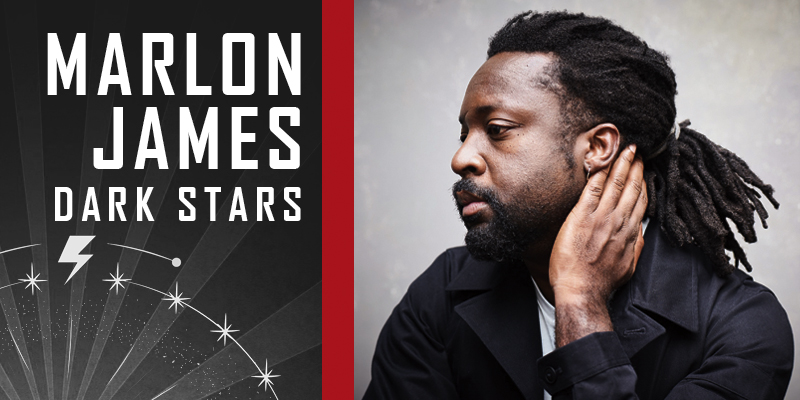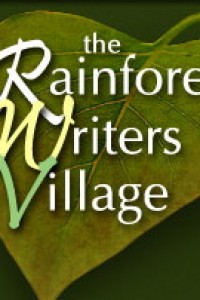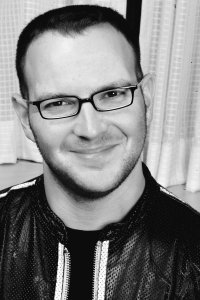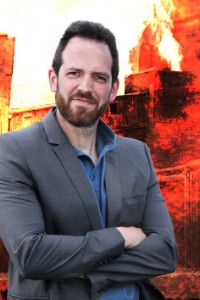Marlon James: Dark Stars

MARLON JAMES was born November 24, 1970 in Kingston Jamaica. He attended the Wolmer’s Trust High School for Boys and attended the University of the West Indies, where he studied Language and Literature, graduating in 1991. He moved to the US, where he later earned his MFA in creative writing at Wilkes University in Pennsylvania in 2006.
His debut novel was John Crow’s Devil (2005), followed by The Book of Night Women (2009) and A Brief History of Seven Killings (2014). The latter won the Man Booker Prize and the OCM Bocas Prize for Caribbean Literature.
Novel Black Leopard, Red Wolf (2019) is an ambitious epic fantasy inspired by African mythology, and begins the Dark Star trilogy. It won a Locus Award for Best Horror novel and also won the inaugural Ray Bradbury Prize for Science Fiction, Fantasy & Speculative Fiction. Second book Moon Witch, Spider King is out in February 2022, with concluding volume White Wing, Dark Star to follow.
Since 2007 James has taught literature at Macalester College in St. Paul MN, and is also a lecturer in the low-residency MFA program in creative writing at St. Francis College. He co-hosts a podcast with editor Jake Morrissey, Marlon and Jake Read Dead People. He is writing a new detective TV series, Get Millie Back, for Channel 4 in the UK and HBO.
Excerpt from the interview:
“I benefited a lot from my MFA program, but it says something that by the time I actually went back for my MFA, I’d already published a book. That said, two professors helped change how I wrote, and I don’t know how their direction would have come otherwise. But even now, too many MFA programs are still teaching everybody to write the same way. There was a job position open at my college, and a lot of people applied, and they sent in their writing samples, and it got to the point where I could read the writing sample and tell you which program they were from.
“I think a writer should go through a kind of apprenticeship. It doesn’t have to be an MFA program. A lot of cities have writing classes that you can join maybe for a month, maybe for a year, maybe even for a week. Minneapolis has one with The Loft Literary Center. There are ways for mentorship to happen. I do think you need an apprenticeship as a writer, because writing is a practice. It could simply be that somebody is generous tonight and they’re going to read your work.
“I think for some of those guys, literary writers who started doing genre books later, they always wanted to do it. There is some credence to the idea that if you get some clout first, they’ll leave you alone to write genre. However, Colson Whitehead’s first novel was sci-fi, The Intuitionist. Jonathan Lethem started with sci-fi as well. I know I had to get to the point where I felt confident enough to do it myself. I remember a few years ago, somebody was asking me, ‘You notice all these Black writers are writing these fantastical novels lately? Why do you think that is?’ My answer was that whenever we’re trying to answer really, really big questions, we always go back to the myths.
“There are a lot of things that realistic literature can’t handle. I have a big problem with people saying they’re writing social realism – it’s a problem with the term. I’m like, ‘Dude, there are no Black people in your novel, and it’s set in New York. Come on.’ I remember feeling sort-of constrained by the so-called realistic novel. Even the novel that a lot of people consider my most realistic, A Brief History, starts with a ghost. The ghost is one of the few characters that makes it to the end of the book. The first time I read Marquez was the first time, honestly, that a book made complete sense to me. I’m not saying that I go around seeing people flying off into the sky and such, but I’ve always lived with that kind of possibility, and I think that if you write things like fantasy, even if it never happens, you still, in the back of your head, have that sense of possibility.
“It says something that Marquez himself didn’t like the term magic realism. I’m not a big fan of the term speculative fiction. All literature is speculative. Otherwise you’re writing non-fiction, and there’s some speculation in some of that, too. It just feels like a kind of a pandering to this so-called literary audience. I never had a snobbish attitude about books because I couldn’t afford to. The only category I needed for a book was that it was next. People think I’m being ironic when I say I love Jackie Collins, when I’m not being ironic at all. I absolutely loved Hollywood Wives, and it’s not a tongue-in-cheek love.
“Make no mistake, The Carpetbaggers by Harold Robbins is a bad novel. But the reason why I don’t think, say, Chances by Jackie Collins is a bad novel, is that Collins understands story. She understands story, she understands conflict, and she understands character. Also, there’s loads of sex in it, and the books are just a lot of fun. I think they’re good fun books, and they’re good commercial writers, if we’re going to use that term, and when you read their imitators, you can see what they don’t understand.
“I teach creative writing, and you have to talk about craft. You have to talk about craft, and practice. I say this to my students: ‘The problem with your writing is not something I can teach you. The problem with your writing is that you’re not writing. You’re not practicing.’ People talk about, ‘When I’m inspired, when inspiration hits,’ and I’m like, ‘Whoah, I haven’t been inspired since Clinton was president.’ I go to my desk and do the work. Practice. I don’t have to tell dancers about craft, or musicians either, but I always have to be telling writers.’
“I usually discourage undergrads from going straight into a graduate program. ‘Go live your life for three or four years,’ I tell them. Go get your heart broken. See the world. Screw up, and then screw up again.’ Because then you’re less likely to fall under the sway of these schools of thought about what a book should be. I had a writer, one of the best writing students I’ve ever come across, a student who made me weep and laugh with the same story. I said, ‘This is one of the best things I’ve ever read. You’re one of the best writers I know. And you’re not going to get into an MFA program.’ I was right – he couldn’t get into any. Took him years and only because there was a sea change at the writing program.
“One major thing that COVID took away was the part of our writing life where you see people like you. The passing acquaintance. The fellow panelist. The friend you only see at conventions and conferences. The book fair buddy. But I just saw somebody’s book tour announcement, and there were some actual dates! This could be great.”
Interview design by Stephen H. Segal.
Read the full interview in the February 2022 issue of Locus.
 While you are here, please take a moment to support Locus with a one-time or recurring donation. We rely on reader donations to keep the magazine and site going, and would like to keep the site paywall free, but WE NEED YOUR FINANCIAL SUPPORT to continue quality coverage of the science fiction and fantasy field.
While you are here, please take a moment to support Locus with a one-time or recurring donation. We rely on reader donations to keep the magazine and site going, and would like to keep the site paywall free, but WE NEED YOUR FINANCIAL SUPPORT to continue quality coverage of the science fiction and fantasy field.
©Locus Magazine. Copyrighted material may not be republished without permission of LSFF.







